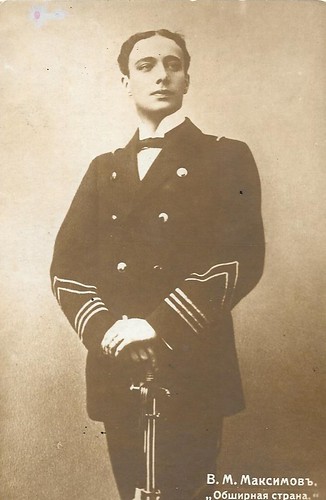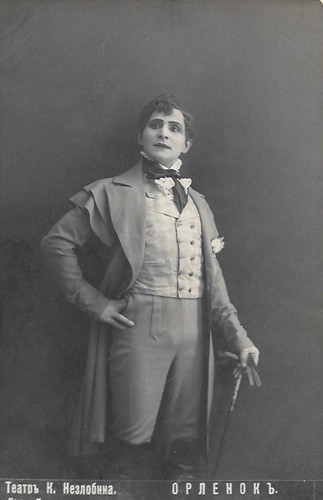Last week, collector Didier Hanson sent me new scans of Russian film postcards from the pre-Soviet era. In October he shared already rare postcards of such silent stars as Vera Karalli, Nathalie Kovanko, Vitold Polonsky and Ossip Runitsch. This time we present you postcards of other stars of the cinema of the Russian empire, like Ivan Khudoleyev, Vasily Kachalov, Vladimir Nikolaevich Davydov, Leonid Leonidov and the beautiful Ye. Volkonskaya.

Ye. Volkonskaya. Russian postcard. Photo: Parikas Foto. Collection: Didier Hanson.
Ye. Volkonskaya is an actress, known for supporting roles in the films La fille sauvage/The wild girl (Henri Étiévant, 1922) starring Nathalie Lissenko and Romuald Joubé, Medvezhya svadba/The Bear's Wedding (Konstantin Eggert, Vladimir Gardin, 1925) with Vera Malinovskaya, and Belyy oryol/The Lash of the Czar (Yakov Protazanov, 1928), starring Vasily Kachalov and Anna Sten.

Vera Kholodnaya. Russian postcard. Collection: Didier Hanson.
Vera Kholodnaya (1893-1919) was the first star of the Russian silent cinema. Only 26, the ‘Queen of Screen’ died of the Spanish flu during the pandemic of 1919. Although she worked only three years for the cinema, she must have made between fifty and hundred short films. The Soviet authorities ordered to destroy many of the Kholodnaya features in 1924, and only five of her films still exist.

Ivan Khudoleyev and Vera Kholodnaya. Russian postcard, no. 137. Collection: Didier Hanson. Photo: publicity still for Posledneiye tango/Last Tango (Vyacheslav Viskovsky, 1918).
Ivan Nikolaevich Khudoleyev (1875-1932) was a Russian silent film actor. From 1917 on he was the film partner of Vera Kholodnaya in films like Isterzannye dushi/Tortured soul (Vladimir Kasyanov, 1917), the Emile Zola adaptation Chelovek - zver/Man - Beast (Cheslav Sabinsky, 1917), Molchi, grust... molchi/Be quiet, sadness ... be quiet (Pyotr Chardynin, Cheslav Sabinsky, 1918) and Posledneiye tango/Last Tango (Vyacheslav Viskovsky, 1918). Later he starred in Soviet productions like Slesar i kantsler/Locksmith and Chancellor (Vladimir Gardin, 1923) and Do zavtra/Until tomorrow (Yuri Tarich, 1929).

Vladimir Maksimov. Russian postcard. Collection: Didier Hanson.

Vladimir Maksimov. Russian postcard. Collection: Didier Hanson.
From 1910 on, Russian stage actor Vladimir Maksimov (sometimes written as Vladimir Maximov, 1880-1937) appeared in films by Yakov Protazanov and Pyotr Chardynin and became a star of the Czarist cinema. He was known for Skorb beskonechnaya/Infinite Sorrow (Aleksandr Panteleyev, 1922), Katsi katsistvis mgelia/Man Is Enemy (Ivane Perestiani, 1923) and Dekabristy/The Decembrists (Aleksandr Ivanovsky, 1927). Maksimov died in 1937 in Moscow.

V. I. Likhachev. Russian postcard. Collection: Didier Hanson.
V. I. Likhachev (1879-1965) was a Russian stage actor, who had a great success as King Dagobert in André Rivoire's play Le Bon Roi Dagobert (Good King Dagobert) (1908) in the Nezlobin theatre in Moscow in 1909 and 1910. Later, Likhachev was imprisoned in the Solovki Prison Camp (1923-1939), where he and other prominent political prisoners performed in the Central Theatre.

Leonid Leonidov. Russian postcard. Collection: Didier Hanson.
Russian actor and stage director Leonid Leonidov (1873-1941) was born in a Jewish family in Odessa (his real last name was Volfenzon, Russian: Вольфензон). From 1903 on, he worked in the Moscow Art Theatre under Konstantin Stanislavski, who called him "the only Russian tragic actor." His roles included Dmitri Karamazov, Othello, and Lopakhin. From 1918 on, Leonidov starred in several films, such as Khleb/Bread (Richard Boleslawski, Boris Sushkevich, 1918) with Olga Baclanova, and Krylya kholopa/The Wings of a Serf (Yuri Tarich, 1926) as Tsar Ivan the Terrible. He began teaching at the State Institute of Theatre Arts in 1935 and was its dean and artistic director from 1939 until his death. In his teaching, he represented the precepts of Stanislavski. Leonidov was honoured with People's Artist of the USSR in 1936.

Vasily Kachalov. Russian postcard. Collection: Didier Hanson.
Russian film and stage actor Vasily Kachalov (1875-1948) was one of Konstantin Stanislavsky's best known performers. He led the so-called Kachalov Group within the Moscow Art Theatre. It was Kachalov who played Hamlet in the Symbolist production of 1911. He also appeared in four films.

Vladimir Nikolaevich Davydov. Russian postcard, no. 2954. Collection: Didier Hanson.
Russian actor Vladimir Nikolaevich Davydov (1849-1925) was born into a noble family of modest means. He took drama lessons from I. V. Samarin, a famous actor of the Malyi Theater. From 1867 to 1880 he acted in the provinces. From 1880 to 1924 he was in the troupe of the St. Petersburg Alexandra Theatre. Davydov's brilliant technique in transforming himself into the character coupled with his ability to make the character seem true to life enabled him for roles in comedy, tragedy, and musical comedy. (He even played female roles.) His greatest achievements were in the Russian classics, especially the dramas of Anton Chekhov. In 1887, he was the original Ivanov in Chekhov's play. In 1883 he started to teach in the St. Petersburg Theatre School. In 1922 he was honoured as People’s Artist of the Republic.

Vera Kholodnaya. Russian postcard, no. 86. Collection: Didier Hanson.

A Who is Who of the Russian silent cinema. In a circle from left: actor Vladimir Maksimov (with bear), actress Vera Kholodnaya, actor Vitold Polonsky, actor Ivan Khudoleyev, actor Ivan Mozzhukin, actor-director Pyotr Chardynin and Ossip Runitsch. Russian postcard, no. 108. Collection: Didier Hanson.
Check out our 12 October 2014 post 'Rare postcards from the Cinema of the Russian Empire'. Many thanks for sharing these postcards at EFSP, Didier!
Sources: The Great Soviet Encyclopedia, Wikipedia and IMDb.

Ye. Volkonskaya. Russian postcard. Photo: Parikas Foto. Collection: Didier Hanson.
Ye. Volkonskaya is an actress, known for supporting roles in the films La fille sauvage/The wild girl (Henri Étiévant, 1922) starring Nathalie Lissenko and Romuald Joubé, Medvezhya svadba/The Bear's Wedding (Konstantin Eggert, Vladimir Gardin, 1925) with Vera Malinovskaya, and Belyy oryol/The Lash of the Czar (Yakov Protazanov, 1928), starring Vasily Kachalov and Anna Sten.

Vera Kholodnaya. Russian postcard. Collection: Didier Hanson.
Vera Kholodnaya (1893-1919) was the first star of the Russian silent cinema. Only 26, the ‘Queen of Screen’ died of the Spanish flu during the pandemic of 1919. Although she worked only three years for the cinema, she must have made between fifty and hundred short films. The Soviet authorities ordered to destroy many of the Kholodnaya features in 1924, and only five of her films still exist.

Ivan Khudoleyev and Vera Kholodnaya. Russian postcard, no. 137. Collection: Didier Hanson. Photo: publicity still for Posledneiye tango/Last Tango (Vyacheslav Viskovsky, 1918).
Ivan Nikolaevich Khudoleyev (1875-1932) was a Russian silent film actor. From 1917 on he was the film partner of Vera Kholodnaya in films like Isterzannye dushi/Tortured soul (Vladimir Kasyanov, 1917), the Emile Zola adaptation Chelovek - zver/Man - Beast (Cheslav Sabinsky, 1917), Molchi, grust... molchi/Be quiet, sadness ... be quiet (Pyotr Chardynin, Cheslav Sabinsky, 1918) and Posledneiye tango/Last Tango (Vyacheslav Viskovsky, 1918). Later he starred in Soviet productions like Slesar i kantsler/Locksmith and Chancellor (Vladimir Gardin, 1923) and Do zavtra/Until tomorrow (Yuri Tarich, 1929).

Vladimir Maksimov. Russian postcard. Collection: Didier Hanson.

Vladimir Maksimov. Russian postcard. Collection: Didier Hanson.
From 1910 on, Russian stage actor Vladimir Maksimov (sometimes written as Vladimir Maximov, 1880-1937) appeared in films by Yakov Protazanov and Pyotr Chardynin and became a star of the Czarist cinema. He was known for Skorb beskonechnaya/Infinite Sorrow (Aleksandr Panteleyev, 1922), Katsi katsistvis mgelia/Man Is Enemy (Ivane Perestiani, 1923) and Dekabristy/The Decembrists (Aleksandr Ivanovsky, 1927). Maksimov died in 1937 in Moscow.

V. I. Likhachev. Russian postcard. Collection: Didier Hanson.
V. I. Likhachev (1879-1965) was a Russian stage actor, who had a great success as King Dagobert in André Rivoire's play Le Bon Roi Dagobert (Good King Dagobert) (1908) in the Nezlobin theatre in Moscow in 1909 and 1910. Later, Likhachev was imprisoned in the Solovki Prison Camp (1923-1939), where he and other prominent political prisoners performed in the Central Theatre.

Leonid Leonidov. Russian postcard. Collection: Didier Hanson.
Russian actor and stage director Leonid Leonidov (1873-1941) was born in a Jewish family in Odessa (his real last name was Volfenzon, Russian: Вольфензон). From 1903 on, he worked in the Moscow Art Theatre under Konstantin Stanislavski, who called him "the only Russian tragic actor." His roles included Dmitri Karamazov, Othello, and Lopakhin. From 1918 on, Leonidov starred in several films, such as Khleb/Bread (Richard Boleslawski, Boris Sushkevich, 1918) with Olga Baclanova, and Krylya kholopa/The Wings of a Serf (Yuri Tarich, 1926) as Tsar Ivan the Terrible. He began teaching at the State Institute of Theatre Arts in 1935 and was its dean and artistic director from 1939 until his death. In his teaching, he represented the precepts of Stanislavski. Leonidov was honoured with People's Artist of the USSR in 1936.

Vasily Kachalov. Russian postcard. Collection: Didier Hanson.
Russian film and stage actor Vasily Kachalov (1875-1948) was one of Konstantin Stanislavsky's best known performers. He led the so-called Kachalov Group within the Moscow Art Theatre. It was Kachalov who played Hamlet in the Symbolist production of 1911. He also appeared in four films.

Vladimir Nikolaevich Davydov. Russian postcard, no. 2954. Collection: Didier Hanson.
Russian actor Vladimir Nikolaevich Davydov (1849-1925) was born into a noble family of modest means. He took drama lessons from I. V. Samarin, a famous actor of the Malyi Theater. From 1867 to 1880 he acted in the provinces. From 1880 to 1924 he was in the troupe of the St. Petersburg Alexandra Theatre. Davydov's brilliant technique in transforming himself into the character coupled with his ability to make the character seem true to life enabled him for roles in comedy, tragedy, and musical comedy. (He even played female roles.) His greatest achievements were in the Russian classics, especially the dramas of Anton Chekhov. In 1887, he was the original Ivanov in Chekhov's play. In 1883 he started to teach in the St. Petersburg Theatre School. In 1922 he was honoured as People’s Artist of the Republic.

Vera Kholodnaya. Russian postcard, no. 86. Collection: Didier Hanson.

A Who is Who of the Russian silent cinema. In a circle from left: actor Vladimir Maksimov (with bear), actress Vera Kholodnaya, actor Vitold Polonsky, actor Ivan Khudoleyev, actor Ivan Mozzhukin, actor-director Pyotr Chardynin and Ossip Runitsch. Russian postcard, no. 108. Collection: Didier Hanson.
Check out our 12 October 2014 post 'Rare postcards from the Cinema of the Russian Empire'. Many thanks for sharing these postcards at EFSP, Didier!
Sources: The Great Soviet Encyclopedia, Wikipedia and IMDb.
1 comment:
These are great images. Love the costume on Ye. Volkonskaya
Post a Comment